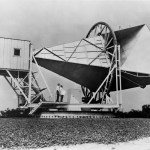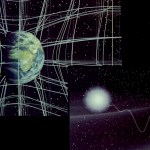Spacetime
In a validation of Albert Einstein's genius, the power of new technology, and the relevance of the scientific method (even if it takes a century), scientists working on a project called LIGO have witnessed ripples in the fabric of spacetime caused by gravitational waves. First predicted by Einstein in 1916 on the basis of general relativity, gravitational waves are cosmic shock waves that can result from the interactions of massive objects like black holes and neutron stars. Unlike electromagnetic waves, which pass through space, gravitational waves change the shape of space itself. Extremely…
“Light thinks it travels faster than anything but it is wrong. No matter how fast light travels, it finds the darkness has always got there first, and is waiting for it.” -Terry Pratchett
It’s the end of the week once again, and so let's have a go at another Ask Ethan! Perhaps inspired by a great giveaway, there have been so many great questions pouring in (and you can submit yours here for four more chances to win), but this week’s comes from our reader and winner Brad (you owe me your email address, Brad), who asks,
When an object is quoted as being 13.8 billion light years…
"I wouldn't know a spacetime continuum or a warp core breach if they got into bed with me." -Patrick Stewart
It's the end of the week once again, and so it's time for another Ask Ethan segment! There have been scores of good questions to choose from that were submitted this month alone (and you can submit yours here), but this week's comes from our reader garbulky, who asks:
Why does gravity decrease the further away you are from the object? I've read that it does decrease with distance squared but not why it does this.
This question seems so simple, and yet the answer -- to the…
"If you look for truth, you may find comfort in the end; if you look for comfort you will not get either comfort or truth only soft soap and wishful thinking to begin, and in the end, despair." -C. S. Lewis
And yet, when you search for the truth, you often find answers that butt up against your sensibilities, your preconceptions, and even your very notions of common sense. Such is the case in this week's Ask Ethan, where longtime reader and commenter MandoZink asks:
I have a question that has perplexed me for most of my life. Recently I sought out and re-read more expert explanations of the…
"Anyone who has never made a mistake has never tried anything new." -Albert Einstein
Back when Einstein first proposed his theory of General Relativity, his revolutionary picture of the Universe was met with a mix of curiosity, awe, and intense skepticism. It isn't every day that your most cherished of all physical theories -- the theory of Newtonian Gravity that had ruled the cosmos for nearly two-and-a-half centuries -- gets challenged by a newcomer.
Image credit: Brooks/Cole - Thomson publishing, 2005.
And yet, that's exactly what Einstein did when he proposed General Relativity at the…
"The views of space and time which I wish to lay before you have sprung from the soil of experimental physics, and therein lies their strength. They are radical. Henceforth space by itself, and time by itself, are doomed to fade away into mere shadows, and only a kind of union of the two will preserve an independent reality." -Hermann Minkowski
When it comes to gravity, you probably think you understand it pretty well.
Image credit: Heavens Above, via http://heavens-above.com/.
Everything with mass (or energy) attracts everything else with mass-or-energy, explaining everything from falling…
"Orbiting Earth in spaceship, I saw how beautiful our planet is. People, let us preserve and increase beauty, not destroy it!" -Yuri Gagarin
Fifty-two years ago today, the first human being left Earth, and we began our journey into outer space. But back in 1961, we didn't really know how far outer space stretched, or where all the matter and energy in the Universe came from.
Image credit: NASA, 1962.
That all changed with the discovery of the Cosmic Microwave Background (by Penzias and Wilson, with the Horn Antenna, above), and subsequent measurements that led us to the Big Bang picture of…
"The mind, once expanded to the dimensions of larger ideas, never returns to its original size." -Oliver Wendell Holmes
When General Relativity supplanted Newton's work as our theory of how gravity works in the Universe, it didn't just change how we view how masses attract, it gave us a new understanding of what the questions where and when actually mean. It gave us the very fabric of spacetime.
Image credit: Christopher Vitale of http://networkologies.wordpress.com/.
What this meant is that no longer could we view objects like matter and radiation as existing in some fixed, grid…
Just about everybody has heard of the Twin Paradox in relativity: one twin becomes as astronaut and sets off for Alpha Centauri, the other remains on Earth at mission control. Thanks to time dilation, the two age at different rates, and the one who made the trip out and back ends up younger than the one who stayed behind.
Of course, the paradox is not that the two twins have different ages-- rather, it's that from a simple approach to special relativity, you would think that each twin should see the other's clock running slow, since it seems like getting into a rocket and flying off into…
So, what's the deal with this one? startswithabang.com reader Scott Stuart asks the following question:
I was reading "The First Three Minutes" last night and came across an
interesting section about blackbody radiation and energy density. The
author states that as the universe expands, the number of photons
running around (in the CMB, for example) is unchanged, but their
wavelengths get stretched. The energy in a photon is, of course,
inversely proportional to its wavelength, so the energy content of a
photon decreases as its wavelength increases. That seems to mean that
the total energy…








